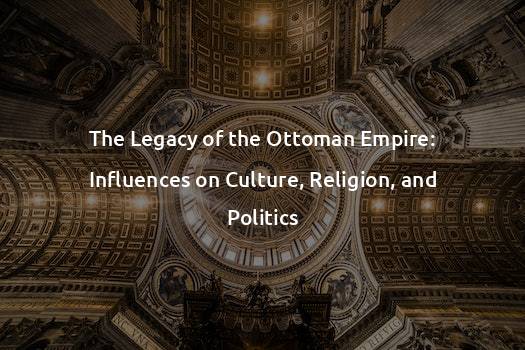The Legacy of the Ottoman Empire: Influences on Culture, Religion, and Politics
The Legacy of the Ottoman Empire: Influences on Culture, Religion, and Politics
The Ottoman Empire, one of the most powerful and enduring empires in history, left an indelible mark on the world. From its foundation in 1299 to its collapse in 1922, the empire encompassed diverse lands, peoples, and cultures. Throughout its existence, the Ottomans played a crucial role in shaping the cultural, religious, and political landscape of the regions they ruled. This article will explore the lasting legacy of the Ottoman Empire and its profound influences on culture, religion, and politics.
Cultural Influence
The Ottoman Empire was a cultural melting pot, bringing together people from various ethnic, linguistic, and religious backgrounds. This diverse mix of cultures resulted in a rich amalgamation of artistic and architectural styles, culinary traditions, and social customs. The empire’s capital, Istanbul, formerly known as Constantinople, became a hub of cultural exchange, attracting artisans, merchants, and scholars from all over the world.
Ottoman architecture, characterized by its grandeur and intricate detailing, incorporated elements from Byzantine, Persian, and Islamic styles. Iconic structures like the Hagia Sophia and the Topkapi Palace exemplify the empire’s architectural prowess and enduring cultural legacy.
The Ottoman Empire’s cultural influence extended to literature, music, and folklore. Renowned poets and writers emerged during this period, composing works that reflected the empire’s diverse cultural heritage. Epic tales such as the “Shahnameh” and the “One Thousand and One Nights” were translated and adapted into Ottoman literature, leaving a lasting impact on the literary traditions of the empire’s successor states.
Religious Influence
The Ottoman Empire’s religious landscape was characterized by its Islamic identity. The empire’s rulers, known as sultans, exercised both political and religious authority. With the establishment of the Ottoman Caliphate in 1517, the sultans became symbolic leaders of the global Muslim community.
The empire’s religious influence extended beyond its borders. Ottoman scholars played a crucial role in the development and dissemination of Islamic knowledge, earning the empire a reputation as a center of Islamic learning. Prominent figures like Sheikh Bedreddin and Sheikh Saad al-Din al-Karashi made significant contributions to fields such as theology, philosophy, and law.
Ottoman religious influence also shaped the architecture of mosques, madrasas, and tombs. The distinctive Ottoman architectural style, characterized by elements such as domes, minarets, and intricate tilework, can still be seen in mosques across the former Ottoman territories.
Political Influence
The Ottoman Empire had a profound impact on the political landscape of the regions it governed. Its centralized bureaucratic structure, known as the devshirme system, allowed for efficient governance and control over a vast empire. The empire’s administrative practices and legal system influenced subsequent states, including modern Turkey.
The empire’s diplomatic and military strategies also left a lasting mark. The Ottoman Empire engaged in alliances and conflicts with European powers, particularly during the height of its expansion in the 16th and 17th centuries. These interactions transformed Europe’s political landscape and shaped the development of modern diplomacy and warfare.
Furthermore, the empire’s millet system, which granted limited autonomy to non-Muslim religious communities, set the stage for the multicultural and multi-religious societies that emerged in the aftermath of its dissolution. This system, though imperfect, allowed for the coexistence of diverse religious groups under Ottoman rule, providing them with a measure of protection and self-governance.
TLDR;
The Ottoman Empire’s legacy is multifaceted, encompassing its influences on culture, religion, and politics. From architecture and literature to Islamic learning and administrative practices, the empire’s impact on various aspects of society is still visible today. Its cultural diversity, religious identity, and bureaucratic systems have shaped the regions it once ruled and continue to shape the modern world.







